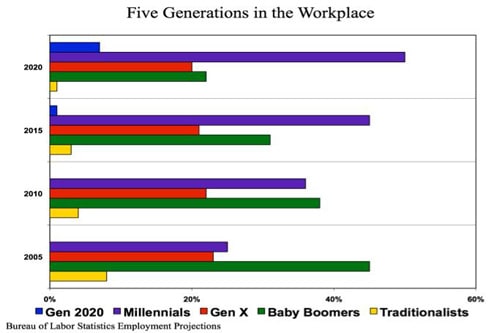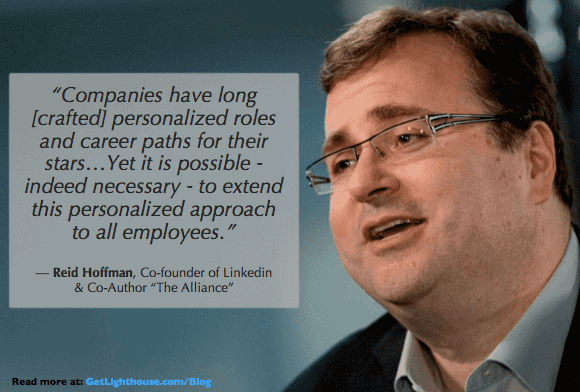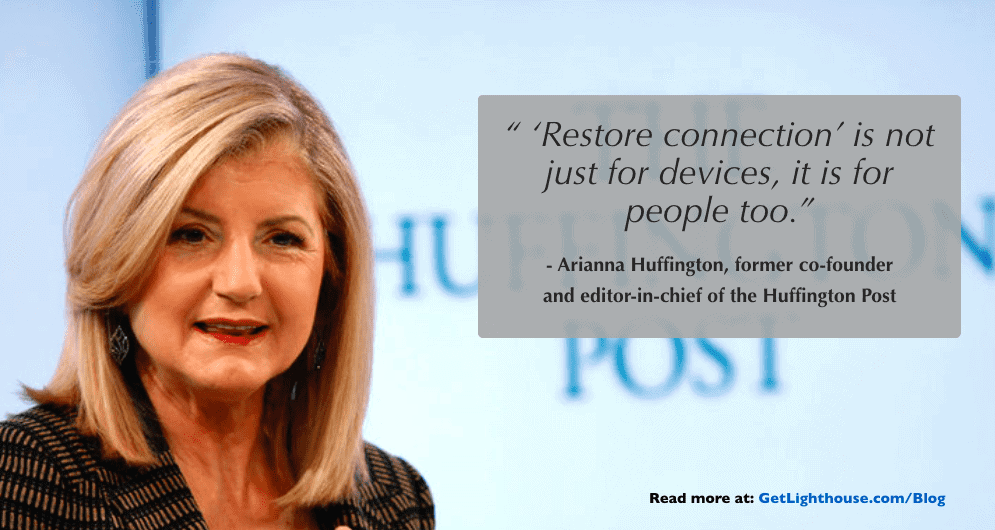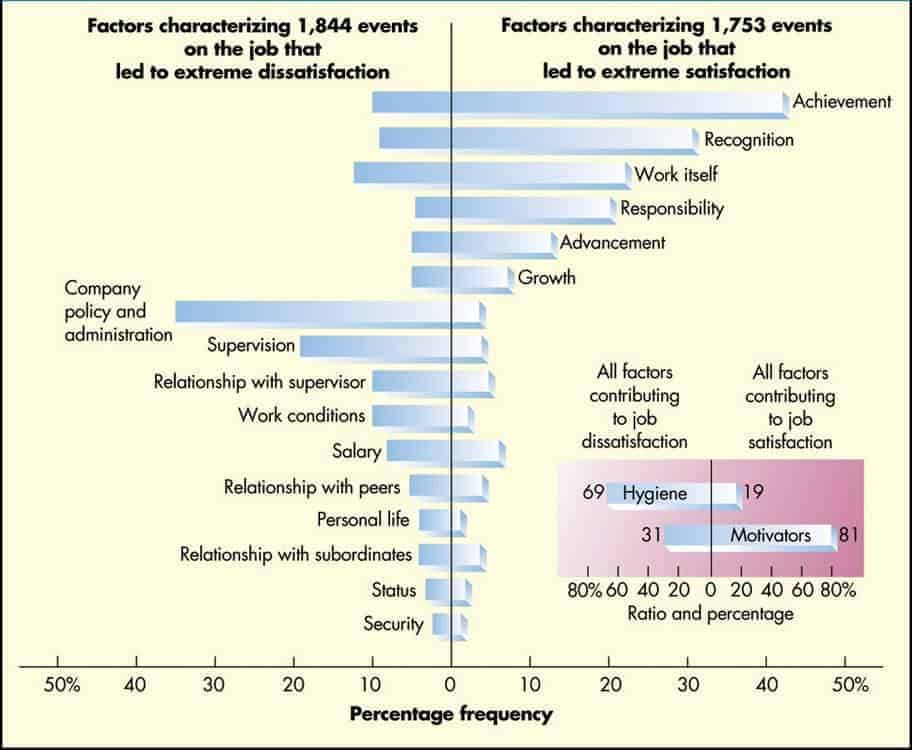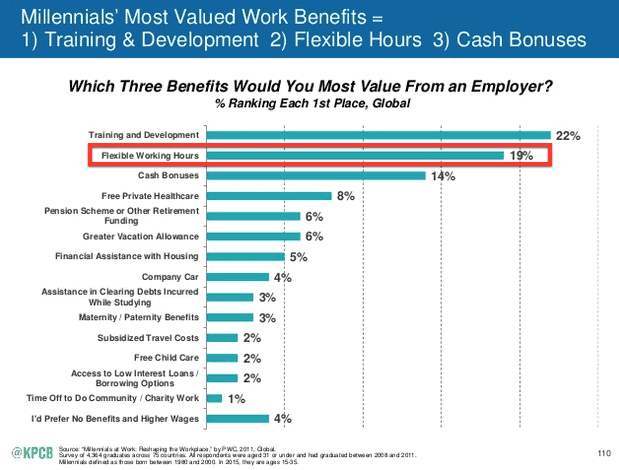Last week, our CEO, Jason Evanish, was a guest on the Voice America podcast talking about "Millennials in the Workplace."
The discussion covered a variety of topics and cited a number of books, stats, and key takeaways that anyone managing Millennials in the workplace can apply.
You can listen to the podcast here:
To go with this, we have a breakdown of some of the key points and takeaways for you here on the Lighthouse blog for your reference. If you're like me, and can struggle with listening thoroughly to podcasts, this is a helpful cliff notes version of a transcript as well.
Managing Millennials in the Workplace: Takeaways from the Voice America Podcast
There were 3 segments to the podcast, so to help you follow along we've broken up the notes and takeaways below along the same lines.
In some cases, topics were revisited in later segments. For clarity of thought, we've grouped the discussion together in the first time it was mentioned as much as possible.
/// Segment 1
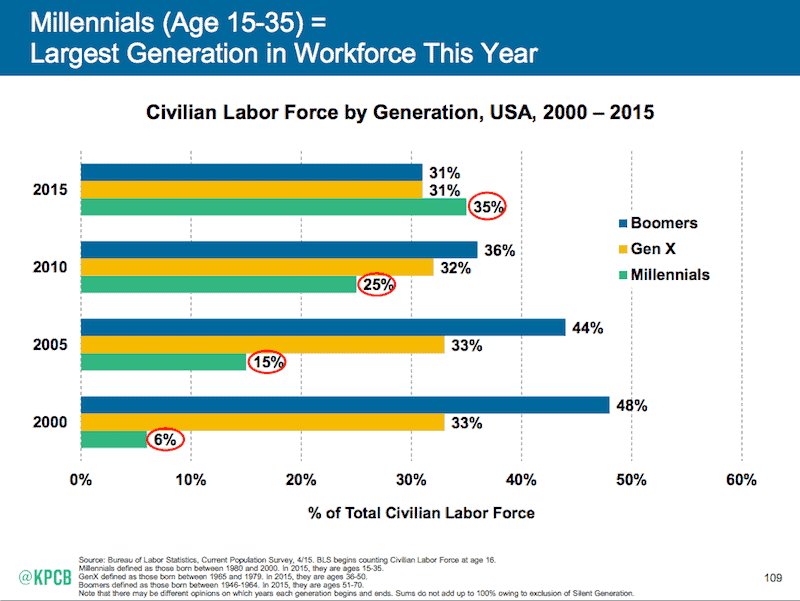
1) Millennials are here to stay
It's popular to blame Millennials for problems, criticize them, and apply negative stereotypes to them. For all the faults of Millennials, there are many extremely talented, hard-working ones that can bring a ton of value to your team or company.
Most importantly though, if you are hiring people for your company, you can't ignore them. As you can see in the chart above (source: Mary Meeker's Internet Trefnds), Millennials are already the largest group in the workforce. And in the next few years, they'll be the majority by 2020 (source: Harvard Business Review):
So whether you're a strong supporter and believer in Millennials, or believe the negative stereotypes, realize that you need to deal with them.
Make the most of the situation and use the tips from the Voice America podcast to learn how you can best manager Millennials in the workplace.
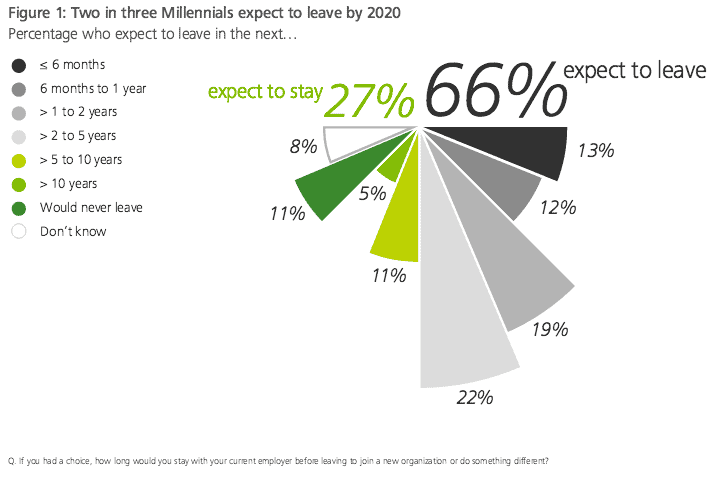
2) Remember the age of Millennials
Are Millennials really that different? Sure, the change in technology definitely has created some of the traits of Millennials: the ability to change jobs quickly, the hunger for information and learning, and comfort with many forms of technology and communication.
However, they're also similar to past generations at their age. In your 20s, you're likely to travel more, spend more time with friends, do occasionally irresponsible things, and not be afraid to change jobs. As you get older, you settle down more, looking for a company you can stay at longer, start a family, etc.
For all the heat Millennials take, a lot of it is really just a reflection of their age. As the get older and enter different stages of life, they'll start to look and act a lot like the generations before them. One example of this is found in Deloitte's study of Millennials, which shows that Millennial parents are more loyal:
"Millennials who are parents show somewhat more loyalty than those without children; 32 percent of the former intend to remain with their current employers for five years or more, compared to 24 percent of the latter.”
If you're a Baby Boomer or a member of Gen X, the next time you want to condemn a Millennial, think back to what you and others you know were like at their age. You might start to better understand them.
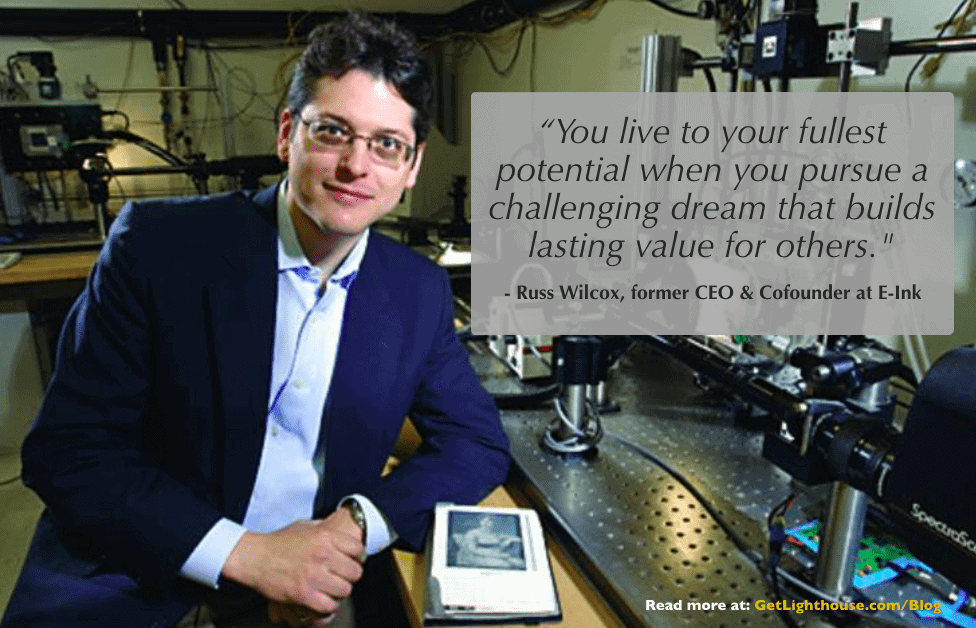
3) Being an accessible leader can boost retention and loyalty.
On the podcast, Jason shares a story about how he got to meet with the CEO of E-Ink when was interning there. The advice helped him in his career and also deeply motivated him; he continued working with the company for a year and a half after that and was motivated to work harder because of it.
[Ed Note: Jason wrote about his experience meeting the CEO of E Ink, Russ Wilcox, on his personal blog here.]
In Segment 2, they revisit this story. Jason reveals the two key lessons he learned from Wilcox:
- Be Persistent: If you want to be a successful entrepreneur, you have to be persistent. You need grit and a never give up attitude, because it's going to be really hard.
- Read 100 Books: It can seem like a lot, but if you break it down into categories, it becomes easier. Read 10 books for every category of skill you need to build and you'll become an expert. (Read how Jason did it in 5 years here.)
Manager Tip: Especially if you're managing Millennials in the workplace, think about what books you can pick up for your team members. Buy the best book possible on a subject they're interested in learning about. You may be surprised how much they appreciate it and how it improves your relationship with them.
/// Segment 2:
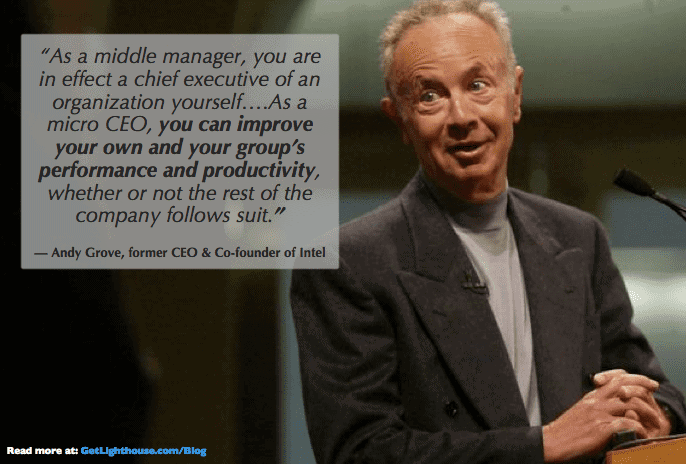
4) People leave managers, not companies
As fellow guest Ben Martinez remarked, "The barrier to change jobs is lower, so the barrier to keep employees is higher." Much of that responsibility falls on a person's manager.
As we've covered on the Lighthouse blog before, retention is largely the responsibility of managers:
- Gallup finds: "The manager accounts for at least 70% of the variance in employee engagement.”
- The top perk employees want is growth, and a manager is best positioned to help.
- Managers contribute to turnover in a variety of ways including poor listening, bad work assignment, and a lack of purpose.
Managers need the right mindset.
Ben shares a great story that is key to flipping managers from doing the wrong things, and losing people, to doing the right things and keeping them.
A coworker of Ben's had lost a great employee. They were now recruiting some of his fellow teammates to join him at his new job. Ben's coworker was angry and wanted to fight the poaching with a "cease & desist" letter. Ben wisely recommended a different path.
Ben told him, "Instead of looking for legal reasons why they can't do this…why don't you focus on what you can do to keep your people?"
The fact is, if you treat people well, and give them a solid growth path, they'll become un-poachable. No one leaves a job they're happy coming to work every day.
5) Tours of Duty are key to retaining Millennials
As the host, Sima Vasa remarked, "Career development is a 2 way street.”
It's also the top perk employees want across studies by PwC, Deloitte, Gallup, Google, and others. As Jason remarked, we've seen so many of these studies, we're tired of reading the same findings again and again.
Enter Tours of Duty.
During the show, Ben Martinez mentioned an awesome book written by Linkedin cofounder Reid Hoffman, "The Alliance." It is all about providing growth to all of your employees.
The days of a pension and working at a company for 40 years are over. The economy isn't built that way anymore. An employee is unlikely to stay that long, and a company is unlikely to keep anyone that long (if they're even in business that long).
Since decades-long retention is less likely, the Tour of Duty acts as a social contract between manager and employee. An employee will gain valuable experience in a job, and the manager promises to help them grow.
This creates a win-win that builds trust and loyalty. As Ben remarked, "Acknowledging that people might leave, is a great way to build a relationship to make them want stay.”
How do you do this?
There's a lot of excuses you can use to prevent you from actually doing this with your team. Here's a few links to overcome them. We want to make sure you do what all the studies say is the #1 thing people want from you:
- I don't know how to have a career conversation! Here's 3 ways to talk with your team about their career goals
- They don't know what their goals are when I ask! Here's how to help them discover what their goals are.
- We have no budget and/or I can't promote anyone. There are TONS of things you can do to grow people without promotion that are low cost.
The only limits to what you can do to grow your people and give them Tours of Duty are your combined creativity and your willingness to work with them on their goals. It doesn't have to take a lot of time. However, it does require you to make it a priority to talk about it.
[Ed note: Want to learn more about Tours of Duty and The Alliance? Read our recap of the book here.]
/// Segment 3:
6) Provide community and connection for your Millennials
With technology in our pockets and on our minds all the time, we're always connected. But the digital connection is not the only connection Millennials want. They also want to feel connected to their workplace.
Ben Martinez shares a few interesting approaches they use at HireVue to create community and connection:
- Friends and family are invited to after work events.
- New hires are brought on in groups so they get to know each other.
- Executives meet and mingle with new hires over a welcome lunch.
Best of all, bringing friends to social events often leads to recruiting opportunities, so everyone wins. It also helps with one of the commonly cited keys to someone being happy at work: having at least one work friend.
While you may think Millennials in the workplace don't need connection beyond their phones, they really do want to connect in real life. Look for opportunities to help your employees connect with each other beyond projects and everyone wins.
7) Perks don't work for Millennials in the workplace.
If you look at some tech companies, you'll wonder if it's a playground or a place of work. While those perks like ping pong tables, free food, and nap rooms make for great photo shoots and recruiting pitches, they don't do much to help with retention.
Ferderick Herzberg researched in the 1950s and 60s what motivates people at work. What he discovered was that what motivates people is different than the hygiene factors that represent base needs and expectations of a workplace.
The picture above shows the hygiene factors that if there's a problem can make an employee unhappy. Unfortunately, these things largely don't contribute to employee motivation and happiness. Instead, key motivators are growth, enjoyable work, and opportunities for recognition and achievement.
Millennials want growth and flexibility.
When surveyed on the top perks they want, Millennials didn't come back with anything considered a traditional perk. Instead, as you can see in the results above, they wanted more growth opportunities, and flexibility in their work schedule.
We've already talked extensively about the importance of growing your people, so let's look closer at the request for flexibility in working hours.
For Millennials in the workplace, they see themselves working at all hours. Whether you go home to friends or family, many employees open their laptops to do more work before bed. In exchange for these extra hours of work, Millennials want some flexibility during the workday.
Is it okay for a parent to step away to take care of their child? Can an employee returning from a trip come in late the next morning, or leave early for a flight? Providing a little flexibility to them is a fair accommodation in exchange for the out of office hours many people log.
This is also at the core of a great talk on Millenials in the workplace by Brian Halligan, CEO of HubSpot, which you can watch here.
Conclusion
Managing Millennials in the workplace presents challenges that no leader can ignore. Like it or not, Millennials are on their way to being the majority of the workforce very soon.
Leaders can choose to hide from the changing rules of work, or they can embrace them. This discussion on Voice America gives you some tactics you can bring back to your team to rise to this challenge.


